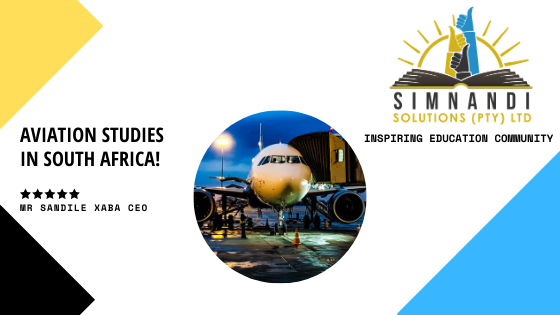Aviation refers to the flying or operating of aircraft, this points to the activities surrounding mechanical flight and the aircraft industry. Aircraft includes fixed-wing and rotary-wing types, morphable wings, wing-less lifting bodies, as well as lighter-than-air craft such as hot air balloons and airships. The South African Civil Aviation Authority (SACAA) is the South African national aviation authority overseeing civil aviation and governing investigations of aviation accidents and incidents. The parent agency for SACAA is national department of transport, which makes SACAA a government body. This paper aims at investigating why are the learners interested in aviation studies are not explicitly provided for under this government body through public aviation academies (schools).
Many learners in public secondary schools in south Africa may be interested in aviation related careers such as; Aircraft Electrical Installer or Technician, Aircraft Manufacturing Engineer, Airline Pilot, Airport Operations Manager, Air Traffic Controller, Aviation Maintenance Technician, Quality Control Personnel(https://www.learnhowtobecome.org/science-technology-careers/aviation/). In its nature, aviation course is a more practical course that requires constant training for mastery purposes. Subjects undertaken in aviation courses are subjects such as; Flight Attendant Training, Dangerous Goods, CRM – Crew Resource Management Fire Fighting, Ditching and Survival, Train the Trainer, CATS & CAR’s Awareness, AVSEC – Aviation Security, Leadership Training and others (https://www.cranfield.co.za/AviationCourses/tabid/57/language/en-ZA/Default.aspx). Now, the pain is that young people interested in aviation studies are in a public secondary school doing subjects that are not even close in relation towards aviation studies subjects. There no public secondary school in south Africa under NCS that offer the aviation course subjects. This means that these young people have lost twelve years and possibly more of their lives in public school system dealing with an irrelevant curriculum.
There are aviation academies (schools) in south Africa but most of them are private academies and they offer the relevant curriculum strictly for aviation studies and nothing else. The children of the rich who are interested in aviation studies are occupying those academies. And the children of the poor are stuck in public secondary schools fed the irrelevant curriculum. This speaks to the difference between public and private education in south Africa and the gap that exists. It is concerning that SACAA is a public owned body and its agency is the public department of transport and yet the government is failing to establish Schools of aviation in major cities in south Africa in order to accommodate learners interested in aviation studies. It is alarming that the south African government owns SACAA and yet the department of education is not bridging the curriculum gap by driving these learners out of NCS public schools to the public aviation academies with a different curriculum. It now becomes vivid that the south African education authorities are not eager to provide relevant curriculum suitable for various learners with various ambitions and talents.
This is another conclusive proof that NCS is a monstrous curriculum that imposes itself upon learners. This curriculum demands that learners should take what is on offer and never question its relevancy to the different aspirations learners may possess. This also proves that NCS is a bossy curriculum that expect a learner to adopt irrelevant subjects offered in public schools, which means learners put on hold their aspirations of life because subjects relevant to their aspired career paths are offered in private schools where they can’t afford to enrol. Education in south Africa is still a painful discriminatory reality just like in the past, yet the government is a democratic government that is 25 years old…meaning they had 25 years to transform education curriculum in our country and provide quality education instead of mediocre curriculum they have been providing to the public. The hard pill to swallow about this curriculum is that it heavily affects the poor people of our country in rural areas and in townships – the government has forgotten about the education of the poor child of south Africa striving in the shacks of the dusty streets of every poor corners of this nation.
It can therefore be concluded that, in order to bring back education hope for our people, personalized education curriculum system (PECS) is of the view that every major city in south Africa, depending on the demand, should have public aviation academies (Schools of Aviation). This is where learners interested in aviation studies can be enrolled with a different relevant curriculum as per the PECS requirements. PECS is of the view that these learners can be isolated and moved away from NCS public secondary schools and be provided with a rare breed of curriculum that offers both theory and practical teaching and learning process at a 50/50 scale to ensure quality production of the future aviation workforce of our country. Is PECS only advocating for aviation studies learners only? no! PECS advocates for learners with different career ambitions to be grouped separately according to various schools such as School of Law, School of Engineering, School of Hospitality and Catering etc. Schools designed and structured in this fashion with quality curriculum will render private schooling in south Africa useless because public education would be now offering learners relevant curriculum rather than the NCS directionless curriculum. Even learners who find themselves in private school will make a U-turn back to public schools. But as long as public schooling remains a shallow operation as it is, private schooling will remain the relevant alternative any day
Know more about PECS: https://simnandisolutions.co.za/personalized-education/ – Click on PECS Powerpoint presentation.
Please answer these 3 questions and submit: https://simnandisolutions.co.za/pecs-questionnaires/


